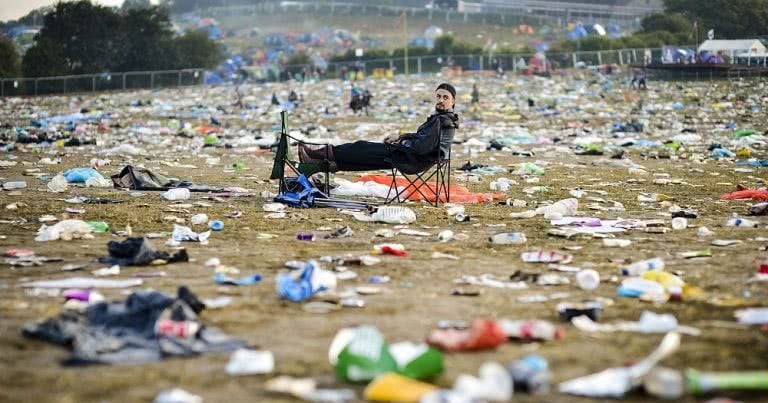Music festivals are practically a rite of passage in Australian culture, but along with the big headline acts and bigger audience numbers there’s another side to high-profile music events that also generates huge numbers, the amount of trash created in the wake of thousands of campers, the carbon emissions generated from those same punters’ travel time and the wastage of vendors and artists on site.
So while music festivals have a huge cultural impact they also have the potential to have a devastating environmental impact as well. As the Village Voice reports, it’s a concern that’s growing for the American festival circuit as it continues to expand to cater to demand but sometimes without making the extra efforts to go green.
Last weekend’s Splendour In The Grass saw 25,000 festival-goers flocking to Yelgun, but that’s a fraction of the 160,000 that stomped onto the desert for California’s Coachella over two weekends, a recent expansion to the festival which basically doubled its numbers and in turn its waste.
Coachella has sustainable initiatives – such as recycling, carpooling, and empty bottles traded for free water – but on-site disposal is either lax or confused, resulting in mountains of rubbish left behind after the event.
Washington’s Sasquatch festival has expanded from a single-day event to a four-day musical extravaganza in its 10 year history, but as Tucker Gumber of thefestivalguy.com complains, “Sasquatch was more like Trashquatch.” “If it’s 10 times the cost, we may have to say that we’re not going to do the most sustainable option.” – Richard Goodstone, Bonnaroo
“It was awful,” complains Gumber to the Village Voice; “The grounds are so pretty, but inside there weren’t enough trash cans, there were no cleaning crews coming through, and the trash next to my campsite didn’t get emptied all weekend.”
Part of the issue isn’t just the attitudes of festival-goers or even organisers, but it can be costly to run eco-friendly programs, a cost that can go straight onto the consumer’s ticket price or adds to the already hefty production costs of running a music festival.
We’ve got an aggressive recycling program, yoga, meditation, free water, and composting,” says Richard Goodstone of Superfly Productions, the team behind US festivals Bonnaroo and Great GoogaMooga. “[But] if it’s 10 times the cost, we may have to say that we’re not going to do the most sustainable option – we can only do so much based on our finances.”
It’s an issue that UK based nonprofit A Greener Festival is looking to tackle more directly, for $315 they will head to a music event and provide green-minded consultancy and ways to improve sustainability as well as offering the AGF Award as an incentive for festivals that are minimising environmental impact.
UK festivals such as Reading, Leeds, and T In The Park were all praised for their efficiency last year, while A Greener Festival has also recognised the efforts of sustainable festival Lightning In A Bottle, where over 140,000 attendees are catered to with recycling, solar power, organic food, and volunteering efforts.
Closer to home, many major Australian music festivals have waste and energy systems in place to make themselves eco-friendly. Splendour In The Grass offers Carbon Offset Tickets to the event as well as patrols of Eco Cops to accommodate the 25,000 or so attendees headed to its Yelgun site. The equally mammoth Byron Bay Bluesfest continues its commitment to environmental sustainability, or as director Peter Noble calls it, ‘Greenfest’.
The Peats Ridge Festival wore its eco-friendly attitude on its green sleeve in its full title of the Glenworth Valley Sustainable Arts And Music Festival (that was before it collapsed amidst a storm of controversy, accusations of embezzlement, and thousands of creditors left out of pocket).
Aunty Meredith is well-known for her waste and green practices, with both of Victoria’s Meredith and Golden Plains events featuring plenty of on-site waste disposal, including regular tidy-ups at the Supernatural Amphitheatre complete with a crowd-selected soundtrack. Elsewhere, smaller boutique festival Boogie last year trumpeted a major milestone: offsetting 500 tonnes of CO2 emissions thanks to efforts with sustainability partner Treecreds over its seven years.
Festival organisers can help encourage eco-friendly behaviour with easier infrastructures, incentives, and penalties, but it also comes down to the attitudes and efforts of festival-goers themselves and their own approach to tidying up after the music party. It’s not easy being green but that’s not excuse to not try.


































